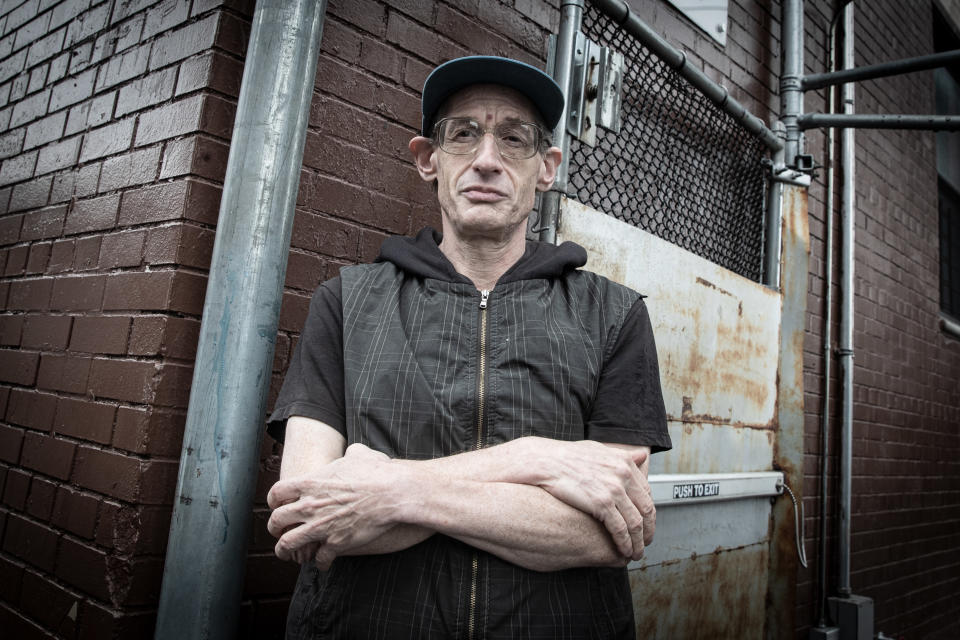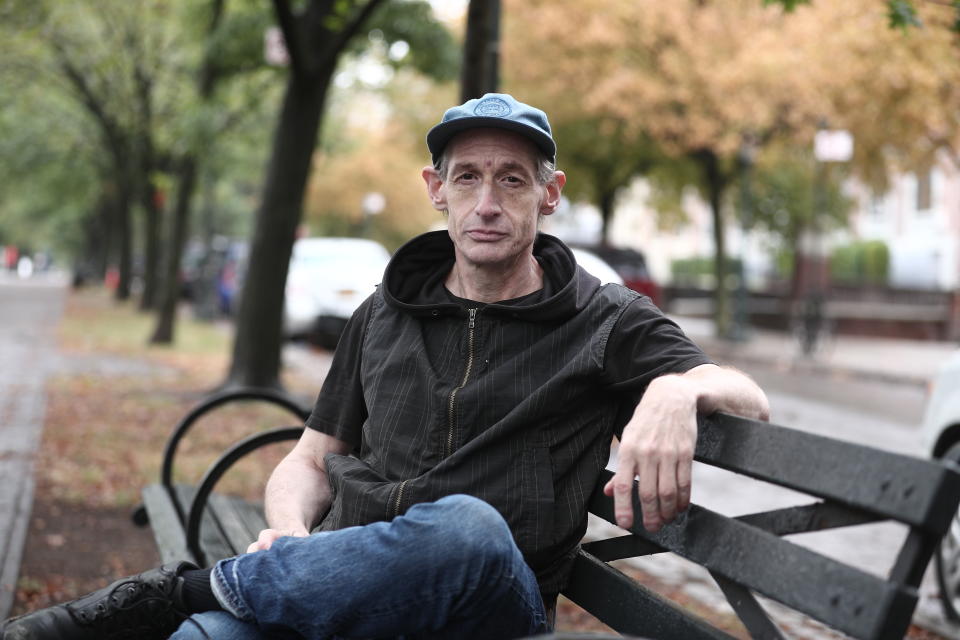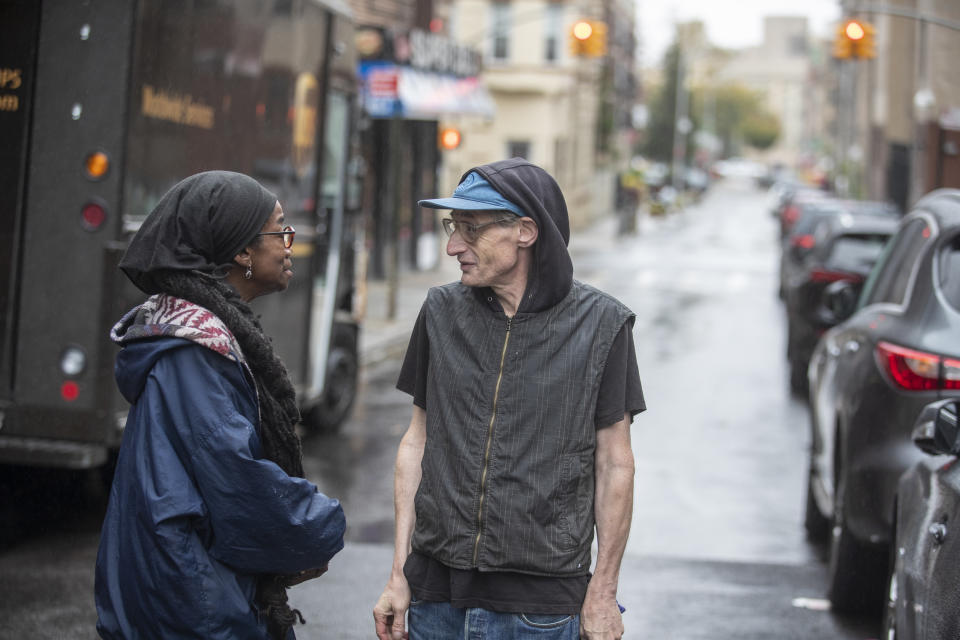What my journey into homelessness taught me

Video produced by Gaby Levesque
With homelessness increasing in the United States, many people, including President Trump, have proposed institutionalizing those who can no longer afford their rent or mortgage costs. But as I learned myself this year, one serious medical event can be all it takes to destroy a stable living situation.
Though I didn’t know it at the time, my descent into homelessness began nine years ago, when I was working as a college music professor in Bronxville, N.Y., where I commuted from my studio apartment in Manhattan. After decades of mental health issues that started with the premature death of my mother when I was 8 years old, I was diagnosed in 2010 with refractory depression, a condition that is unresponsive to traditional treatment, and I began receiving monthly electroshock therapy. That physically taxing procedure weakens memory, and made my job as a teacher untenable. Unable to continue working, I was forced to go on government disability and for the next nine years I struggled to cobble together money for rent. Finally, at the age of 58, I bundled my life into a suitcase and backpack and, in May, set up camp in a beige room at the Renaissance Men's Shelter in the Crown Heights section of Brooklyn.
Renaissance serves 200 men whom the city designates as MICA, an acronym for “mentally ill and chemical abusing,” and my roommates, who range in age from 24 to 66, blur the distinction. A 39-year-old opium addict named Matthew, for example, self-medicates for anxiety and depression, while Noah, an elderly crack smoker, is schizophrenic. The room where we sleep each night has a locker room odor — a mixture of sweat, urine and mildew — and contains five steel-frame cots, each next to a maroon locker that almost scrapes the ceiling. There are no trash cans, so my four roommates leave their uneaten food, cigarette stubs and plastic bags on the floor near the door, a spot that would be perfect, it seems to me, for a trash can. All summer long, central air conditioning keeps my dormitory so cold that I half-expect to see my breath. Each night I put on three pairs of socks, two shirts, a sweater and a hoodie before slipping under two heavy blankets.

A simmering threat of confrontation pervades the five-story building, and sometimes residents act out violently against authority figures or other residents. I’ve witnessed a couple of overdoses and several fights, including a brawl between two security guards — one of whom left the grounds in an ambulance.
The night I first came to the shelter, someone threw a chair into a circle of residents waiting to check in. Two months later, a middle-age resident from down the hall entered the room where I sleep and attacked Noah with a cane, demanding $5. I pulled the cane away and forced the man out of the room, but though we reported the incident, no one bothered to investigate it or file charges.
Days at Renaissance Men's Shelter start at 7 a.m., when the basement cafeteria serves breakfast. Every resident must leave the building on weekdays between 9:30 a.m. and 4:30 p.m. while attendants clean the dorms and hall bathrooms. Residents who don’t have legitimate day jobs or a place to go can stay either in the television lounge or the computer room during the day. When you suffer from disabling depression, you find out pretty quickly who your real friends and family are. My own history, which includes a bout of anorexia when I was 11, a major mental breakdown at age 41 and a suicidal episode at 48, eventually alienated some family members who suspected me of exaggerating my condition in order to get out of working. Fed up at my lack of improvement, many friends stopped calling or returning messages because, I suspect, they feared I might impose on them.

My first few months at the shelter, I’d walk half an hour to a friend’s house to dog-sit. He was a former television actor on “Law & Order,” and I’d helped him and his husband out with money after the two became homeless following his AIDS diagnosis. Some karma. Before his husband’s death this year, he found an apartment, but last month took on a roommate to help pay the rent, so now I usually pass my days at the Brooklyn Public Library.
Matthew and Noah spend the days panhandling or hanging out in “the yard,” a concrete space about the size of a basketball court that’s surrounded by a chain-link fence. There, residents congregate to smoke, exercise or buy and sell drugs. Some residents I’ve spoken to say they prefer selling dope to taking minimum-wage jobs (having a prison record makes getting hired in the first place nearly impossible) because they can make more money, set their own hours and avoid expensive commutes.
Matthew, who is part Native American, is married, though he and his husband separated last year. He calls me his “gay father” for listening to his plans and problems, offering my observations and floating him a few bucks now and then. He reciprocates by giving me snacks he buys with food stamps and intricate bracelets made of twine and colored beads that he constructs himself.
Another of my roommates is Jamal, a 24-year-old aspiring architect. One of the smartest people I’ve ever met, he has been at Renaissance for almost two years while on parole from a narcotics conviction for which he still performs weekly community service. When I met him, he’d recently found a job at a church on Manhattan’s Lower East Side and seemed close to leaving the shelter, but he has seven children by six different women to support, so he had to time his next move carefully.

Early in my tenure at the shelter, a midtown therapist who treats me for PTSD from a pre-shelter incident advised me that a homeless shelter is not a monolithic mass of tattooed land sharks. It is stratified into interest groups and hierarchies. She predicted that some of these interests might coincide with mine, and suggested that I remain open to meeting allies or even friends. She was right.
Jamal asked me to mentor him three months ago. This arrangement, which I accepted, puts him in a category with five other millennials at the shelter I call the Lost Boys. They are all smart and artistic — some are straight, some are gay — though our relationships are strictly platonic. These misfits need adequate role models and guidance, and may be drawn to me because I was once a professor, a position that exposed me to some of their generation’s diverse concerns.
Yet turnover at the shelter is also a constant feature of life here. Noah, for example, the schizophrenic senior citizen, began soiling his bed and the floor during the night, so the staff moved him to another room where he could receive more direct supervision. The resident who took over Noah’s bed, Angel, paints his fingernails and toenails bright pink or green. He is very quiet except when angry — then he sprays the room with a firehose of profanity, usually repeating a single phrase interrupted by intense coughing fits.
Half of the residents are overweight or obese, some talk to themselves constantly and a few don’t bathe enough. It’s not easy to sympathize with people who appear to have so little going for themselves. Addicts are subject to even harsher judgement, since taking illicit drugs can seem like a reckless decision for those who have difficultly controlling themselves in the first place. But most of the people I’ve met at Renaissance turned to drugs as a way to deal with the anxiety, stress and loneliness of being a social outcast.

Case managers meet weekly with each resident to help them get health care, locate housing, employment and funds from charity and the government. Finding housing is the longest part of the glacial process of leaving the shelter. Due to staff turnover, I’m working with my third case manager in three months, along with a housing specialist and a public assistant specialist.
After five months at the shelter, and completing each bureaucratic phase one step at a time, I’m still not ready to submit my public housing application to the city. Often, I find myself waiting weeks or longer for responses from the city, state and federal offices that will either allow me to advance to the next step, or else result in a dead end.
While it’s easy to complain about shelter life, that doesn’t mean I’m ungrateful. At no charge, Renaissance provides three hot daily meals, a clean place to sleep, space to store clothes and personal effects, and a laundromat where the staff washes and dries your clothes for you. I have not seen a single roach, louse, bedbug, rat, mouse or any other vermin. Ordinarily, the shelter is relatively safe, and the employees — none of whose jobs seem easy — are by and large decent to the residents.
Everyone who ends up in a homeless shelter is here because they either don’t have families and friends who can support them, or they don’t want to deal with what such support would entail. For me, the line I can’t cross is giving up my independence and creativity, which is why the idea of forcing homeless people into institutions strikes me as so wrongheaded. Though it may sound counterintuitive, many homeless people survive through self-reliance, something institutionalization would take from them. Homeless people aren’t on the streets or in shelters because we are lazy. We fight every day just to keep ourselves from losing ground, and I’ve also seen the system help place people I’ve met in respectable jobs and homes.
This month, Jamal finally did move out of Renaissance. He is working more hours at his church job and is living in a Brooklyn apartment with a new girlfriend. As a mentor and de facto den mother, knowing that another Lost Boy might have been found gives me hope and makes me feel that, for all that’s gone wrong, I’m doing something right.

_____
Download the Yahoo News app to customize your experience.
Read more from Yahoo News:
Hunter Biden's work in Ukraine is a problem, but not just for Democrats
Intelligence whistleblowers face a dangerous path to Congress
Experts criticize White House use of sensitive computer system to store Trump transcripts
PHOTOS: Hong Kong protester shot and dozens arrested as Trump lauds China on National Day

